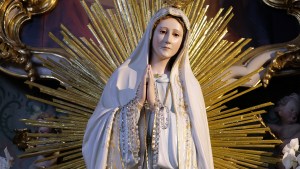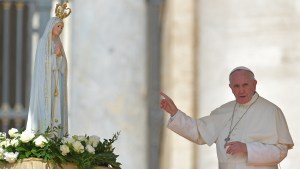Pope Francis’ upcoming consecration of Russia and Ukraine to the Immaculate Heart of Mary on March 25, 2022, is a very powerful event, symbolically, politically, and especially spiritually. But what does it mean?
I.MEDIA analyzes it in seven questions.
To consecrate something or someone means to dedicate them for a sacred purpose. The term is often used in the vocabulary of the Catholic Church for places (churches), persons (consecrated religious or consecrated men/women) and liturgical objects. As well, at the heart of the Christian faith, the term is used to refer to the consecration of the Eucharist during Mass. As a devotion, one can also consecrate oneself personally (a votive consecration) to Christ through Mary. This approach to personal consecration was extended to cities or regions in the Middle Ages. Louis XIII consecrated France to Mary in 1638, an action that has since been imitated by bishops and popes for other specific countries and places, and even for the entire world.
2What is the “Immaculate Heart of Mary?”
The Immaculate Heart of Mary is a specific Catholic devotion to one aspect of the holiness of the Mother of God: her total purity—confirmed by the relatively recent declaration of the dogma of the Immaculate Conception in 1854. This devotion is very recent, from the 19th century, although it is based on the Mariological principles of medieval theologians such as Saint Anselm of Canterbury and Saint Bernard of Clairvaux, which in turn go back to the enduring faith of the Church in Mary’s predilection. It underwent important development in France from 1830 onwards with the apparitions at Rue du Bac, during which the immaculate nature of the Virgin’s soul was revealed to Saint Catherine Labouré. But it is especially with the Marian apparitions of Fatima (Portugal) starting in 1917 that the devotion to the Immaculate Heart of Mary took on an important scale. During an apparition, the Virgin is said to have declared that in order to save men from hell, God wished to “establish in the world the devotion to [her] Immaculate Heart.”
3What is the link between Russia and Fatima?
To understand this link, we must go back to the revelation of July 13, 1917, in which the apparition prophesied “a night illuminated by an unknown light” announcing God’s punishment of the world “by means of war, famine and persecution against the Church and the Holy Father.” In order to prevent these calamities and to assure the world “a certain time of peace,” Our Lady asked for “the consecration of Russia to [her] Immaculate Heart” as well as for “reparative Communion” every first Saturday of the month.
4Was the consecration of Russia carried out?
During the Second World War, Pius XII—at the request of Lucia, one of the visionaries of Fatima—decided to consecrate the world to the Immaculate Heart of Mary. Paul VI followed in 1964, and John Paul II in 1982 and then in communion with all the bishops of the world in 1984. Finally, Francis made the same act on October 13, 2013, at the beginning of his pontificate. The consecration to the world on March 25, 1984 by John Paul II, in the context of the Cold War, was subject to many controversies and even conspiracy theories. At the origin of these was the Pope’s choice not to expressly mention Russia during the consecration ceremony, even though it was particularly evoked by the text. In any case, the specific consecration of Russia had already been made by Pius XII in 1952, as evidenced by his apostolic letter Sacro Vergente Anno. Moreover, the Fatima visionary Lucia affirmed that Our Lady’s request for consecration was indeed fulfilled in 1984.
5Why re-consecrate Russia if it has already been consecrated?
A “re-consecration” is possible in two cases: firstly, in response to a desacralization, and secondly, in order to strongly reaffirm a devotion. The former case applies especially to objects; one could think of a church being reconsecrated after it had been desecrated. The latter case applies especially to devotions, and many of the faithful renew their personal consecrations yearly, if not more frequently.
The Holy See has not given clear details about the forthcoming consecration, and it could be either case. Russia and Ukraine may be seen as “desacralized” by the war that is tearing them apart. Most likely, however, Pope Francis wants to renew the requests for intercession made by his predecessors in view of the gravity of the current situation.
6Do we “have” to believe in the messages of Fatima?
The 2011 preface by Cardinal William Levada, then prefect emeritus of the Congregation for the Doctrine of the Faith, on the subject of “Procedural Norms for the Discernment of Presumed Apparitions or Revelations” reminds us that the Church recognizes only “the event of Jesus Christ” as “the summit of Revelation.” It makes reference to the words of St. John of the Cross: “Whoever would now question the Lord and ask him for visions or revelations would not only be foolish, but would also be doing injustice to God, by not casting his eyes solely on Christ and seeking something else or something new.”
The Synod on the Word of God in 2008 addressed this “problem of experiences related to supernatural phenomena in the life and mission of the Church.” In his exhortation Verbum Domini, Benedict XVI specified that no “public revelation” can be recognized as valid by the Church, but that a “private revelation” can give rise to “new forms of piety” and have “a certain prophetic character.”
“It is a help which is offered to us, but we are not obliged to use it,” said the German pope, known for his focus on the link between faith and reason.
7Ukrainians call for novena to prepare; no reaction from Russian Orthodox
Major Archbishop Sviatoslav Shevchuk, primate of the Ukrainian Greek Catholic Church, reacted in a statement released on March 16, explaining that this was a “spiritual act that has been awaited for a long time by the Ukrainian people,” not only since the beginning of the current Russian offensive but since the war began in 2014.
“As I met with the Holy Father, I passed on this desire of the faithful of our Church,” the archbishop said. He recalled that in her apparition of July 13, 1917, Our Lady had asked to stop “the errors of Russia, which causes wars and persecutions.”
“We entrust to the Immaculate Heart of Mary all our sufferings and the hopes for peace of our martyred people,” said the spiritual leader of the Ukrainian Greek Catholic minority, four to five million strong. He himself had performed an act of consecration of Ukraine to the Immaculate Heart of Mary on October 23, 2016, in Fatima.
Archbishop Mieczysław Mokrzycki of Lviv, Ukraine, called for a novena to begin March 17 and conclude March 25, to prepare for the consecration. “We are calling all Christians in Ukraine to join this novena, and we would be very grateful if the whole Church around the world would join us in prayer for this intention.”
The worldwide Knights of Columbus organization is joining with this initiative, “I call on my 2 million brother Knights to unite in prayer to the Blessed Virgin Mary,” Supreme Knight Patrick Kelly said in a statement. “Together, we’ll ask Our Lady to intercede on behalf of those directly impacted by the conflict, to give strength to our Ukrainian and Polish Knights working so hard to deliver relief, and to help bring peace and healing to the region.”
For his part, Archbishop Paolo Pezzi, Archbishop of the Diocese of Moscow and President of the Bishops’ Conference of the Russian Federation, told the Sir news agency that he welcomed with “great joy and gratitude the decision of the pope.”
“Fatima, at least as far as the Catholic Church is concerned, has a special link with Russia and also with every conflict that occurs in the world,” he said, stressing that “the symbolic significance of this consecration” is of course linked to the need “to stop the bloodshed” in Ukraine.
The Russian Orthodox Church has not commented on the news for the moment.



